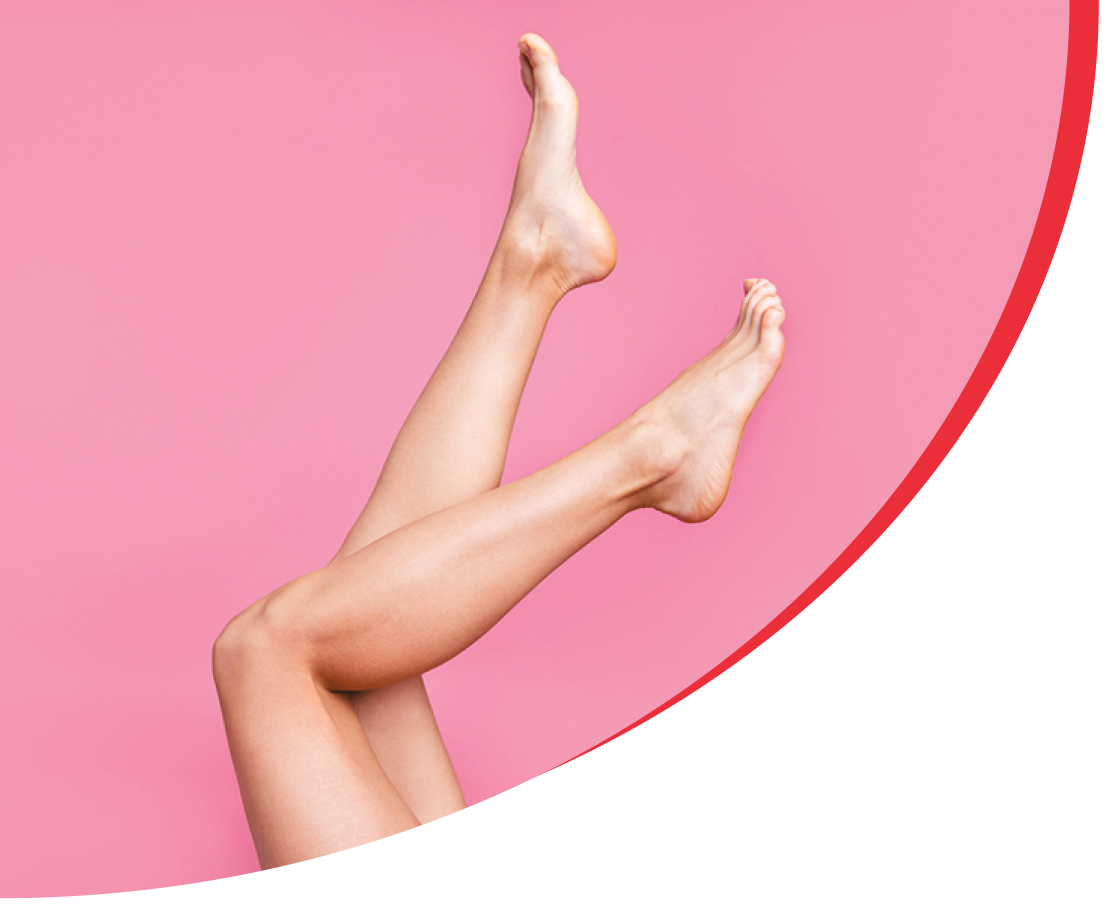Varicose Veins Treatment
Treatment Options
The treatment for varicose veins (varicosities) can reduce your symptoms, improve your quality of life, and prevent worsening conditions. We offer several treatment options:
Lifestyle Modifications
- Exercise regularly to improve blood circulation in your legs.
- Maintain a healthy weight to reduce pressure on your veins.
- Elevate your legs when resting to help blood flow.
- Avoid sitting or standing for long periods without breaks.
Sclerotherapy
- This is a common treatment for smaller varicose veins and spider veins. A solution is injected into the affected veins, causing them to collapse and eventually fade away.
Compression Stockings
- Graduated compression stockings can help reduce the symptoms of varicose veins by applying pressure to the legs, promoting better blood flow.
EVLT / Radiofrequency Closure
- These minimally invasive procedures use laser or radiofrequency energy to close off and seal the problematic vein. Blood is then rerouted to healthier veins.
Vein Stripping
- This surgical procedure involves the removal of the affected vein through small incisions. It is usually reserved for severe cases of varicose veins.
Ambulatory Phlebectomy
- In this minimally invasive procedure, small incisions are made to remove the varicose veins through a series of tiny punctures. It is often used for surface varicose veins.
Endoscopic Vein Surgery
- This surgical approach may be necessary for severe cases where the varicose veins are causing skin ulcers. An endoscope is used to remove or close the affected veins.
Lifestyle Changes
- Continuing to follow lifestyle recommendations is crucial for managing varicose veins and preventing their recurrence.
What are the Benefits of Treating Varicose Veins?
Treating varicose veins can offer several benefits, including:
Symptom Relief
One of the primary reasons people seek treatment for varicose veins is to alleviate the associated symptoms. Treatment can help reduce or eliminate symptoms such as leg pain, aching, heaviness, swelling, cramps, and itching, improving overall comfort and mobility.
Improved Quality of Life
Managing varicose veins can lead to an improved quality of life by reducing discomfort and pain. This can result in better sleep, increased physical activity, and the ability to engage in daily activities without hindrance.
Prevention of Complications
Untreated varicose veins can lead to complications such as skin ulcers, phlebitis (inflammation of the veins), and blood clots. Treating varicose veins can help prevent or reduce the risk of these complications.
Cosmetic Enhancement
Many individuals seek treatment for varicose veins for cosmetic reasons. Removing or reducing the appearance of varicose veins can boost self-confidence and body image.

Improved Blood Circulation
Treating varicose veins can help restore proper blood circulation in the legs. This can reduce the risk of blood pooling in the veins and lower the risk of developing new varicose veins or worsening existing ones.
Enhanced Physical Activity
When varicose vein symptoms are managed, individuals are often more inclined to engage in physical activities and exercise. This can lead to better overall health and fitness.
Reduced Discomfort During Pregnancy
Pregnant women who develop varicose veins may experience relief from treatment. It can help alleviate pain and swelling during pregnancy and improve overall comfort.
Long-Term Health Benefits
Managing varicose veins can contribute to better long-term vascular health. It may lower the risk of developing more serious venous conditions, such as deep vein thrombosis (DVT).
Customized Treatment Plans
Healthcare providers can develop personalized treatment plans based on the severity of varicose veins and individual patient needs, ensuring that the chosen treatment aligns with the specific goals and circumstances of the patient.
Treating varicose veins can offer several benefits, including:
Symptom Relief
One of the primary reasons people seek treatment for varicose veins is to alleviate the associated symptoms. Treatment can help reduce or eliminate symptoms such as leg pain, aching, heaviness, swelling, cramps, and itching, improving overall comfort and mobility.
Improved Quality of Life
Managing varicose veins can lead to an improved quality of life by reducing discomfort and pain. This can result in better sleep, increased physical activity, and the ability to engage in daily activities without hindrance.
Prevention of Complications
Untreated varicose veins can lead to complications such as skin ulcers, phlebitis (inflammation of the veins), and blood clots. Treating varicose veins can help prevent or reduce the risk of these complications.
Cosmetic Enhancement
Many individuals seek treatment for varicose veins for cosmetic reasons. Removing or reducing the appearance of varicose veins can boost self-confidence and body image.
Improved Blood Circulation
Treating varicose veins can help restore proper blood circulation in the legs. This can reduce the risk of blood pooling in the veins and lower the risk of developing new varicose veins or worsening existing ones.
Enhanced Physical Activity
When varicose vein symptoms are managed, individuals are often more inclined to engage in physical activities and exercise. This can lead to better overall health and fitness.
Reduced Discomfort During Pregnancy
Pregnant women who develop varicose veins may experience relief from treatment. It can help alleviate pain and swelling during pregnancy and improve overall comfort.
Long-Term Health Benefits
Managing varicose veins can contribute to better long-term vascular health. It may lower the risk of developing more serious venous conditions, such as deep vein thrombosis (DVT).
Customized Treatment Plans
Healthcare providers can develop personalized treatment plans based on the severity of varicose veins and individual patient needs, ensuring that the chosen treatment aligns with the specific goals and circumstances of the patient.
Are you a candidate for varicose veins treatment?
Candidates for varicose vein treatment include: individuals who experience symptoms related to varicose veins, those with cosmetic concerns, and individuals at risk of developing complications associated with varicose veins. The specific criteria for treatment candidacy may vary depending on factors such as the severity of the condition and the treatment goals. Here are some considerations:
Cosmetic Concerns
Some individuals seek varicose vein treatment primarily for cosmetic reasons. If the appearance of varicose veins affects self-esteem or body image, they may choose to pursue treatment to improve the aesthetics of their legs.
Functional Impairment
Varicose veins can impact mobility and daily activities. People who find that their varicose veins hinder their ability to lead an active lifestyle, work, or perform routine tasks may consider treatment to improve their functional capacity.
Chronic Venous Insufficiency (CVI)
CVI is a more advanced form of venous disease that can be associated with varicose veins. Candidates for treatment may include those diagnosed with CVI who experience severe symptoms and complications.
Complications
Individuals who are at risk of or have developed complications related to varicose veins, such as skin ulcers, superficial thrombophlebitis (inflammation of the veins), or recurrent bleeding from varicose veins, may require treatment to address these issues and prevent further complications.
Symptoms
People who experience symptoms associated with varicose veins, such as leg pain, aching, heaviness, swelling, cramps, or itching, may be candidates for treatment. The severity and duration of these symptoms are important factors in determining the need for treatment.
Pregnancy
Pregnant women who experience discomfort or complications due to varicose veins may be candidates for treatment. However, treatment options during pregnancy may be limited, and non-invasive approaches like compression stockings are often recommended until after delivery.
Personal Preferences
Ultimately, the decision to seek varicose vein treatment may also depend on personal preferences and priorities. Some individuals may choose to pursue treatment solely for symptom relief or cosmetic reasons, while others may opt for conservative management or no treatment if their symptoms are mild or do not significantly impact their quality of life.
Our providers are nationally recognized experts in minimally-invasive therapies for treating Varicose Veins. We provide treatment for patients with Varicose Veins throughout Western MA and Northern CT. To learn more about treatments available at New England Vein Center call 413-693-2852 to make an appointment.

